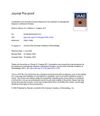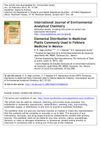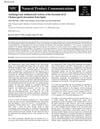 3 citations
,
May 2023 in “International Journal of Molecular Sciences”
3 citations
,
May 2023 in “International Journal of Molecular Sciences” A new treatment using nanoparticles can effectively prevent and reduce hair loss caused by chemotherapy.
 5 citations
,
April 2022 in “Journal of Ethnopharmacology”
5 citations
,
April 2022 in “Journal of Ethnopharmacology” Chinese herbal medicine can help treat hair loss by promoting hair growth and preventing cell death, maintaining a balance between hair growth and loss.
January 2022 in “Drug Delivery” The aloe ferox gel with finasteride and oregano oil may effectively treat alopecia.
December 2021 in “Clinical and Experimental Dermatology” Systemic minoxidil might help maintain hair regrowth in alopecia areata.
 11 citations
,
October 2021 in “Carbohydrate Polymers”
11 citations
,
October 2021 in “Carbohydrate Polymers” Ginkgo biloba polysaccharides may reduce inflammation and promote hair growth in mice with hair loss.
 11 citations
,
October 2021 in “Stem Cell Research & Therapy”
11 citations
,
October 2021 in “Stem Cell Research & Therapy” Hair follicle stem cells reduced hair loss and inflammation in mice with a condition similar to human alopecia.
 10 citations
,
September 2021 in “JAMA Dermatology”
10 citations
,
September 2021 in “JAMA Dermatology” Different types of persistent hair loss after chemotherapy respond differently to treatments.
 8 citations
,
May 2021 in “Applied Materials Today”
8 citations
,
May 2021 in “Applied Materials Today” New nano composite helps reduce scars and regrow hair during burn wound healing.
 39 citations
,
February 2021 in “Journal of The American Academy of Dermatology”
39 citations
,
February 2021 in “Journal of The American Academy of Dermatology” Low-dose oral minoxidil safely treats hair loss, with hypertrichosis as main side effect.
 5 citations
,
December 2020 in “Journal of The American Academy of Dermatology”
5 citations
,
December 2020 in “Journal of The American Academy of Dermatology” Minoxidil and spironolactone improve hair density and reduce shedding in girls.
49 citations
,
November 2019 in “Archives of Dermatological Research”  7 citations
,
October 2019 in “Klinická onkologie”
7 citations
,
October 2019 in “Klinická onkologie” Cancer treatments often cause hair loss and damage, affecting patients' mental health.
 23 citations
,
September 2019 in “Journal of The American Academy of Dermatology”
23 citations
,
September 2019 in “Journal of The American Academy of Dermatology” Tofacitinib and oral minoxidil together effectively regrow hair in severe alopecia areata patients.
 52 citations
,
May 2019 in “Journal of The American Academy of Dermatology”
52 citations
,
May 2019 in “Journal of The American Academy of Dermatology” Low-dose oral minoxidil effectively improves male hair loss with mild side effects.
 13 citations
,
March 2019 in “Journal of ethnopharmacology”
13 citations
,
March 2019 in “Journal of ethnopharmacology” Cacumen Platycladi oil promotes hair growth better than minoxidil.
 20 citations
,
March 2019 in “Journal of The European Academy of Dermatology and Venereology”
20 citations
,
March 2019 in “Journal of The European Academy of Dermatology and Venereology” Minoxidil effectively and safely treats patchy hair loss, but more research needed.
29 citations
,
February 2019 in “Journal of Microbiology and Biotechnology” Silibinin may help hair growth and treat hair loss.
45 citations
,
June 2018 in “Frontiers in immunology” MDSC-Exo can treat autoimmune alopecia areata and promote hair regrowth in mice.
 11 citations
,
January 2018 in “RSC Advances”
11 citations
,
January 2018 in “RSC Advances” Cedrol cream is more effective and safe for promoting hair growth than traditional treatments.
 80 citations
,
December 2017 in “International Journal of Dermatology”
80 citations
,
December 2017 in “International Journal of Dermatology” Low-dose oral minoxidil and spironolactone combo effectively reduces hair loss and improves hair density in women.
 6 citations
,
December 2017 in “Journal of Cosmetic and Laser Therapy”
6 citations
,
December 2017 in “Journal of Cosmetic and Laser Therapy” Low-level laser therapy can improve hair density in people with androgenic alopecia, but more research is needed to find out who it works best for.
 14 citations
,
July 2016 in “Environmental Toxicology and Pharmacology”
14 citations
,
July 2016 in “Environmental Toxicology and Pharmacology” Cedrol may prevent hair loss caused by chemotherapy better than minoxidil.
 39 citations
,
July 2016 in “Biomedicine & Pharmacotherapy”
39 citations
,
July 2016 in “Biomedicine & Pharmacotherapy” Cedrol from Platycladus orientalis leaves may promote hair growth effectively, especially in female mice.
 3 citations
,
April 2016 in “The journal of investigative dermatology/Journal of investigative dermatology”
3 citations
,
April 2016 in “The journal of investigative dermatology/Journal of investigative dermatology” Curcumin applied to the skin can start hair growth in mice.
 36 citations
,
May 2015 in “Australasian Journal of Dermatology”
36 citations
,
May 2015 in “Australasian Journal of Dermatology” Low dose oral minoxidil helps regrow hair in permanent chemotherapy-induced alopecia.
 24 citations
,
January 2014 in “The American Journal of Chinese Medicine”
24 citations
,
January 2014 in “The American Journal of Chinese Medicine” The leaves of Platycladus orientalis have potential health benefits but require more research for safety and understanding how they work.
 24 citations
,
February 1987 in “Drugs”
24 citations
,
February 1987 in “Drugs” Minoxidil promotes hair regrowth, but more research needed for effectiveness and response factors.
 80 citations
,
October 1983 in “BMJ”
80 citations
,
October 1983 in “BMJ” Minoxidil helps hair regrowth in alopecia patients, with 16 having good results and no side effects.



























